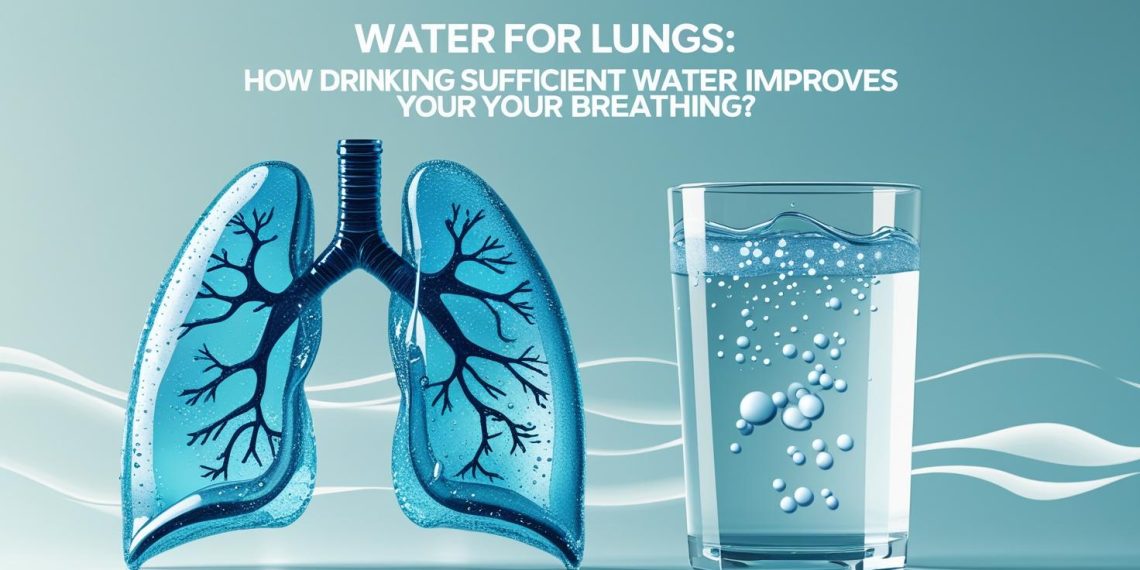Last updated on June 11th, 2025 at 11:09 am
At the heart of efficient respiratory function lies an often-overlooked element: water. Our lungs, composed of nearly 80% water, rely heavily on proper hydration to operate smoothly. Without adequate fluid intake, the entire respiratory system can falter, leading to difficulty in breathing, thick mucus buildup, and increased susceptibility to pulmonary complications.
How Water Affects the Respiratory Tract
Hydration Maintains Mucosal Moisture
The respiratory tract is lined with a mucosal membrane that traps dust, pathogens, and allergens. For this defense mechanism to function effectively, it must stay moist. Drinking water ensures that the mucus lining remains thin and fluid, allowing it to trap foreign particles efficiently and facilitate their removal via cilia movement.
Read: $3 Billion for Lead Pipe Replacement to Deliver Clean Drinking Water
Thin Mucus Means Easier Breathing
When we’re dehydrated, mucus becomes thick and sticky, obstructing airways and making breathing labored. This is particularly problematic for individuals with asthma, bronchitis, or COPD, where airway clearance is already compromised. Regular water intake helps in thinning the mucus, making it easier to expel and thereby enhancing oxygen flow.
The Role of Water in Oxygen Transport
Water plays a vital role in the transport of oxygen from the lungs to the bloodstream. It facilitates the diffusion of oxygen through the alveolar membrane, ensuring that every breath counts. When hydrated, red blood cells remain plump and efficient in binding and delivering oxygen to tissues throughout the body.
Water Supports the Diaphragm and Lung Expansion
Our diaphragm, the main muscle involved in breathing, relies on electrolytes and fluid balance to function without fatigue. Dehydration can lead to muscle cramps, including those in the diaphragm, restricting lung expansion and causing shortness of breath. By maintaining hydration, we ensure optimal muscular efficiency during respiration.
Water as a Natural Detoxifier for the Lungs
Hydration aids in flushing out toxins through various means, including exhalation. During each breath, water vapor exits the lungs, carrying with it trace toxins and volatile compounds. Without sufficient hydration, this natural detox pathway becomes less effective, and the lungs become vulnerable to pollutant accumulation.
Hydration Enhances Immunity Within the Lungs
The lungs are constantly exposed to pathogens. Water supports the immune defenses of the respiratory system by enabling the smooth circulation of immune cells and antibodies. Moreover, hydrated lungs are more resistant to inflammation and infection, especially during seasonal changes or polluted conditions.
Read: EPA Sets First Federal Limits on Dangerous ‘Forever Chemicals’ in Drinking Water
Hydration and Chronic Respiratory Diseases
Asthma and Water Consumption
Asthmatic individuals benefit from regular hydration, as it minimizes the risk of mucosal thickening and bronchial spasms. Water assists in keeping the bronchioles clear, reduces wheezing, and can even aid in reducing the severity of an asthma attack when consumed consistently.
COPD and Lung Function
Patients with Chronic Obstructive Pulmonary Disease (COPD) often struggle with mucus retention. Water plays a central role in clearing airways, boosting ciliary movement, and improving overall lung compliance. In addition, hydration reduces respiratory fatigue, a common symptom in COPD patients.
Cystic Fibrosis and Fluid Therapy
In cystic fibrosis, the body produces abnormally thick mucus. A higher water intake, often supplemented with electrolyte-rich fluids, is necessary to keep this mucus manageable. Proper hydration can make a significant difference in the quality of life and pulmonary outcomes in these patients.
Impact of Hydration on Environmental Exposure
In polluted environments or during wildfire seasons, airborne toxins can dry out the lungs. Inhaling dry air or particulate matter can exacerbate dehydration. Drinking sufficient water forms a protective hydration barrier, reducing the risk of lung irritation and inflammation.
Hydration and Breathing During Exercise
During physical activity, our breathing rate increases, and with it, water loss through respiration. Athletes and active individuals must replenish this loss to avoid respiratory inefficiency. Drinking water before, during, and after exercise improves pulmonary elasticity and reduces the sensation of shortness of breath.
Recommended Water Intake for Respiratory Health
While the standard recommendation is 8–10 glasses of water per day, individuals with respiratory issues, those in dry climates, or those exposed to pollutants may require more. Fluid intake should be consistent throughout the day to maintain steady mucosal hydration and support continuous lung performance.
Warning Signs of Dehydration Affecting the Lungs
- Dry or irritated throat
- Persistent coughing
- Thick, yellow mucus
- Shortness of breath
- Chest tightness
- Increased respiratory rate during rest
These signs indicate that your lungs are not operating at full efficiency due to inadequate hydration.
Hydration-Boosting Foods and Beverages
In addition to plain water, certain foods and beverages help maintain optimal hydration levels:
- Coconut water: Rich in electrolytes, supports respiratory muscle function
- Herbal teas: Soothe the airways and offer mild hydration
- Fruits like watermelon, oranges, and cucumbers: High water content and rich in vitamin C
- Broth-based soups: Hydrate while providing minerals for lung repair
Avoid excessive consumption of caffeine and alcohol, as they are diuretics that may exacerbate dehydration.
Read: The Most Effective Way to Eliminate PFAS and PFOA from Your Drinking Water
Hydration Strategies for Better Lung Function
- Begin your day with a glass of warm water to loosen overnight mucus
- Keep a water bottle nearby and sip regularly rather than waiting for thirst
- Use a humidifier to maintain moist air and reduce water loss from respiration
- Monitor urine color as a simple indicator—light yellow suggests good hydration
Conclusion: Water Is the Unsung Hero of Respiratory Health
Breathing effortlessly is something we often take for granted—until it becomes difficult. By prioritizing hydration, we support the lungs’ ability to filter air, expel waste, and oxygenate the body. Whether you’re managing a chronic condition, living in a polluted city, or simply aiming for better wellness, drinking enough water is a non-negotiable step toward optimal respiratory health.
Choose Pure Water- Choose AMPAC USA
When increasing your water intake for lung health, make sure that you drink pure and contamination-free water. For that, trust AMPAC USA’s water treatment products. We provide the best-in-class reverse osmosis water treatment systems. We are also among the top providers of various water treatment solutions that help you get clean and contamination-free water every day. We provide the best reverse osmosis systems for residential, commercial, and industrial needs. They help ensure the water is tasteless, colorless, and odorless.
AMPAC USA water systems are well equipped and fully capable of converting any water into a product that meets the requirement of the end-user. Capable of performing flawlessly in harsh environments, our products assist the exploratory labs at the Arctic Circle to Oil rigs in Deserts, urban communities, and war zones. AMPAC USA water treatment systems are proven solutions to water treatment problems across the globe.
AMPAC USA’s advanced water purification systems are built to solve the most complex challenges related to water purification, treatment, provisioning, and Seawater Desalination, meant to work in the harshest environments around the globe. Our water treatment systems use the best Reverse Osmosis, Seawater Desalination, and water technologies of international standards for industrial, On-shore, and Offshore applications.
AMPAC USA designs and manufactures some of the world’s most reliable Commercial Reverse Osmosis Systems to treat water even in the toughest environments. We additionally strive for quality of international standards and excellent after-sales service. Our engineers are available to support your water treatment applications anywhere around the world. To know more, call AMPAC USA at 909-548-4900 or visit us here.











Thanks for sharing. I read many of your blog posts, cool, your blog is very good. https://www.binance.info/zh-CN/register?ref=IJFGOAID
Your point of view caught my eye and was very interesting. Thanks. I have a question for you.
Your point of view caught my eye and was very interesting. Thanks. I have a question for you.